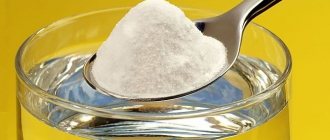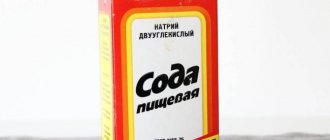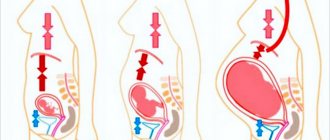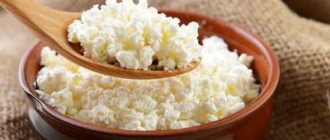Soda for heartburn is one of the common remedies that help get rid of the problem at home, but it has contraindications; in any case, it is not recommended to use it often.
Baking soda (sodium bicarbonate, sodium bicarbonate, baking soda, sodium bicarbonate) is a sodium salt of carbonic acid, which has the chemical formula NaHCO3. When this substance interacts with hydrochloric acid of the stomach, the latter is neutralized, which eliminates the burning sensation in the esophagus.
Soda for heartburn can be used only occasionally
Soda for heartburn: how to dilute, proportions
To achieve the effect, you can simply drink a small amount of soda with a glass of water or drink a solution of soda in water.
Step-by-step instructions for preparing an aqueous solution
- To prepare the product, use warm (36-37 °C) boiled water.
- Dissolve 1/2 or 1/3 teaspoon of soda in 1/2 cup of water.
- The mixture is thoroughly stirred and drunk in small sips while warm (the liquid should not be allowed to cool, as this may reduce the effectiveness of the product).
- After taking the soda solution, it is advisable to loosen tight clothing and accessories that may squeeze the body, and take a sitting or reclining position (but not lying down!).
The effect occurs within 5-10 minutes.
Other recipes for soda solutions
There are several prescription medications that contain sodium bicarbonate. In addition to the most popular described above, these are:
- Soda with lemon juice . Add a little lemon juice to the soda solution (the permissible amount is 0.5 teaspoon). When bubbles appear, drink the liquid in small sips.
- Soda with apple cider vinegar and sugar . Dissolve 1 teaspoon each of apple cider vinegar and sugar in 1 glass of water, then add 1 teaspoon of sodium bicarbonate to the mixture. When the liquid starts to fizz, you need to drink it slowly.
Recommend me something for heartburn that will last longer.
Modern antacid drugs that are not absorbed in the digestive tract, such as aluminum phosphoric acid or aluminum-magnesium drugs, are suitable for you. They bind hydrochloric acid quite quickly - usually within a few minutes after ingestion - and their effect lasts up to several hours. Maximum duration of action
characteristic of drugs containing aluminum hydroxide. They act for 2.5–3 hours [2].
How effective is soda against heartburn: pros and cons
Many patients suffering from heartburn are interested in whether it is possible to drink soda for heartburn, and whether its use is harmful to the body. It is permissible to take baking soda for quick relief of the condition in the absence of gentle antacids, if this symptom occurs rarely in a person. Prolonged heartburn requires close attention, as it is usually a symptom of some disease; if it occurs, it is better to visit a doctor and not self-medicate, which can do more harm than good.
The benefits of the product include:
- availability and low cost:
- fast action.
There are many more disadvantages:
- Sodium bicarbonate can only temporarily relieve unpleasant sensations, but does not in any way affect the cause of their occurrence, i.e., does not contribute to healing.
- When sodium bicarbonate interacts with gastric acid, carbon dioxide (CO2) is released, which irritates the mucous membranes of the gastrointestinal tract, which can provoke increased production of hydrochloric acid.
- The effect of using a soda solution is short-lived, after which the patient’s condition may worsen.
- An increase in the amount of sodium in the body can lead to increased blood pressure and the development of edema of the upper and lower extremities.
- When using sodium bicarbonate, headaches, increased irritability, bloating, nausea, vomiting, abdominal pain, and diarrhea may occur.
This product should not be used if:
- a number of diseases of the cardiovascular system;
- gastritis;
- peptic ulcer;
- during pregnancy and lactation (pregnant women often experience swelling, sodium can aggravate it).
In addition to a burning sensation in the esophagus, a patient with heartburn may experience belching, nausea and vomiting, abdominal pain, an unpleasant taste in the mouth, heaviness in the stomach, and flatulence. You must understand that soda will not help solve all these problems.
Contraindications
Pregnant women should not use baking soda if they have heartburn.
There are a number of situations when it is not recommended to use soda for heartburn. True, a single dose rarely causes harm.
Below are cases when it is necessary to completely eliminate sodium bicarbonate from use to correct heartburn. Contraindications:
- pregnancy, lactation (not all doctors consider pregnancy a reason to give up soda if you have heartburn, but it’s still better not to take risks and under no circumstances take this substance, as most experts believe);
- pathology of the cardiovascular system;
- chronic arterial hypertension;
- diabetes;
- some gastrointestinal pathologies (in particular, ulcers that can cause bleeding);
- individual intolerance (allergy).
These contraindications may cause an increase in heartburn after taking soda. In addition, relapses are common. In most cases, negative consequences occur after frequent use of soda, but it happens that one dose leads to a completely unexpected result. And then it takes a lot of time and effort to get rid of such unpleasant consequences.
If a person has the contraindications mentioned earlier, it is necessary to choose another remedy to correct the condition of heartburn. There are many special medicines in pharmacies, and various folk remedies are known.
Other folk remedies
The table presents some folk remedies that can be used at home for burning in the esophagus (after consultation with your doctor).
| Means | Explanation |
| Vegetable juice | You can consume individually or a mixture of juices (potato, cabbage, carrot, beet) 2-3 tablespoons before meals for treatment and prevention. |
| Mineral water | In the absence of contraindications, you can drink slightly alkaline or alkaline water 50-250 ml 3 times a day. Before use, the water must be heated to approximately 40 °C and the gas must be released. |
| Chamomile infusion | The infusion is prepared from 1-2 teaspoons of dry raw materials and 1 cup of boiling water. The product is infused for 20 minutes, filtered and drunk in small sips (no more than 3 glasses per day). |
| Infusion of a mixture of herbs | 0.5 tablespoons of plantain leaves, chamomile flowers and St. John's wort are poured into 1 liter of boiling water, left for 15 minutes in a warm place, and taken 1 tablespoon before meals 3 times a day. |
| Infusion of yellow gentian | Gentian yellow root (20 g) is poured with boiling water (1 glass), the mixture is allowed to cool and drunk 1 tablespoon 30 minutes before meals. |
| Flax seed infusion | Ground flax seeds (3 teaspoons) are poured into 1 cup of boiling water and left overnight. The resulting liquid is drunk one sip before and after each meal, as well as before bed. |
| Viburnum jam | Viburnum jam (1 tablespoon), which is dissolved in 1 glass of boiled water and drunk as tea, can relieve an attack. |
| Mumiyo | Shilajit (0.2 g) is mixed with 1 tablespoon of water or milk and taken in the morning and before going to bed for 4 weeks, after which you need to take a break for 2 weeks. |
In addition, during a severe attack of heartburn, you can chew almonds or oatmeal.
Alkaline mineral water has the same effect on heartburn as soda
How to drink soda for gastritis
Baking soda is often used to relieve heartburn. The substance, entering the stomach, reduces its acidity. As a result, pain is relieved. However, experts recommend using baking soda only when no other treatment is available.
Patients with gastritis should drink soda solutions as rarely as possible, because under its influence the balance between acid and alkali in the body is disrupted.
The following symptoms may appear:
- thirst;
- weakness;
- convulsions.
As a result, the patient's condition may worsen.
For diseases of the stomach with low acidity, soda, when it enters the body, triggers chemical processes. It reacts with hydrochloric acid, resulting in the formation of water, gas, and carbonic acid. These processes can negatively affect the gastric mucosa, worsening the condition of a patient with gastritis.
Heartburn Treatment Approach
For persistent heartburn, the patient, after examination, is prescribed drug therapy. Lifestyle changes are indicated (including eating right and giving up bad habits). Some patients require surgery.
In addition to following a diet, how much food a person takes is also important. So, to eliminate this symptom, it is recommended to consume no more than 200 ml of food at a time. Food should be eaten warm, avoiding too hot or cold foods. The last meal should be at least 3 hours before bedtime. It is also not recommended to lie down for at least 1 hour after eating; physical activity is allowed no earlier than 2 hours later.
Other methods to combat heartburn
There are more advanced and effective methods to combat heartburn than baking soda. Doctors now widely use prokinetics - drugs that normalize gastrointestinal motility. Simply put, they force different parts of the digestive system to contract correctly. Due to this, food moves faster and easier through the gastrointestinal tract, does not stagnate in the stomach and does not provoke the reflux of hydrochloric acid. In addition, prokinetics ( itomed ) tone the lower esophageal sphincter - the valve between the esophagus and the stomach, which blocks the path of gastric juice.
Other ways to get rid of heartburn:
- Lose excess weight: in obese people, the stomach is always under pressure, hence the risk of heartburn;
- Change your eating habits: Avoid heartburn trigger foods. Traditional ones are hot, fatty, salty, spicy, alcohol, chocolate, caffeine, etc. But you can create your own personal list of prohibited foods if you keep a food diary;
- Eat often in small portions, the last meal is 3 hours before bedtime;
- Stop smoking;
- Wear loose clothing that does not restrict movement;
- Sleep with the head of the bed raised.
And remember: if left untreated, heartburn can transform into a serious pathology, simply because it is just a sign of problems in the body. Temporary – if it appears once a month. And serious ones - if he reminds you of himself every two or three days.
Why might there be a burning sensation in the esophagus?
According to statistics, in developed countries heartburn develops in 20-50% of the population. In the absence of disease, an unpleasant symptom can be observed when overeating, consuming low-quality products, or breaking the diet.
They can help:
- alcohol abuse;
- smoking;
- frequent stressful situations;
- use of a number of medications;
- overweight:
- excessive consumption of strong tea and coffee, chocolate, salty, spicy, sour foods, canned food, fried and fatty foods, carbonated drinks;
- horizontal position, playing sports or other physical activity immediately after eating;
- food for the night.
This condition often occurs in women during pregnancy.
Persistent heartburn is usually a sign of the following diseases:
- Gastroesophageal reflux disease (reflux esophagitis) - when a weakening of the esophageal sphincter causes stomach contents to be thrown into it, which has an irritating effect on the mucous membrane.
- Gastritis with high acidity.
- Peptic ulcer of the stomach and duodenum.
- Liver diseases.
Sometimes a burning sensation behind the sternum is mistaken for heartburn, but in fact serves as a manifestation of pathologies of the cardiovascular system (for example, an attack of angina).
If gastric contents enter the esophagus for a long time, complications may occur - scars, ulcerations (and bleeding), tumors. Therefore, if you have persistent heartburn, you should not treat it with soda or other improvised means, but you must seek medical help and, if necessary, begin treatment.
Why does heartburn occur?
Heartburn may be caused by poor diet.
The reasons for this phenomenon are quite banal and obvious - this is such a common violation of the diet, as well as the far from ideal quality of the products that we eat, including the consumption of alcohol, coffee and chocolate in quantities exceeding acceptable standards.
In people whose weight exceeds physiologically acceptable norms, heartburn occurs more often, and people who smoke are at risk of experiencing an unpleasant burning sensation in the stomach more often than non-smokers.
Poor external ecology also does not contribute to improving health. You shouldn’t get carried away with very tight clothes that squeeze your stomach.
At the moment, medicine and pharmaceuticals have made great strides in treating this disease and relieving unpleasant symptoms, but for a long time the simplest, most accessible and widespread method is treatment with ordinary soda, which is found in almost every kitchen.
Soda for heartburn: how to take while breastfeeding a baby
During lactation, women experience disruptions at the hormonal level, which may result in heartburn attacks. At the same time, steroid and lactotropic hormones, which regulate changes in the body of a nursing mother, can also have negative manifestations, which are further expressed in the form of repeated attacks of heartburn.
Lactation is a very significant period in the life of every woman, however, it is also characterized by some health risks.
At this time, the immune system is weakened and there is an exacerbation of all chronic pathologies in the body: gastritis, stomach ulcers, etc. Which are accompanied not only by nausea and pain, but also by frequent manifestations of heartburn.
However, during the period of feeding the baby, you should not resort to soda , due to the fact that this causes an imbalance in the intestines, and in the future may affect the quality of the nursing mother’s milk, which will affect the baby’s health.
It is important to know! Taking soda for heartburn during pregnancy and lactation is not the best way to get rid of the disease, since it carries many negative consequences for the baby, as well as for his mother.











